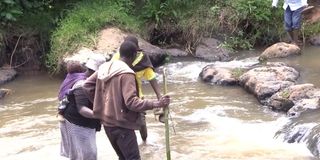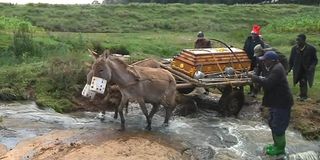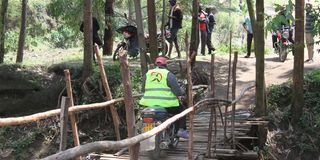Impassable roads: A people neglected by their leaders

James Wakuwa helps residents of motoni farm to cross over to ndimu farm .
Improved road infrastructure is what most politicians use to get political mileage while seeking votes. Factoring in whose promises will get them to the land of milk and honey, the people cast their votes.
However, after the shiny crown sits on their head, the elected leaders seem to suffer from amnesia.
Mtaa Wangu sets to Kuresoi North, Kimkasa area, where the situation is so dire, that residents ferry bodies with donkeys because of the poor road.

Residents of Kuresoi North use donkeys to ferry a body to the burial place because of poor road conditions.
Esther Njenga, starts off by saying it's unfortunate that their ward representative is a no show, even as they continue to bear the brunt of bad roads in the area.
“We cannot give our loved ones a decent send off because of poor roads. Here we take pride in owning a donkey. It’s also a symbol of status than a car, because of their resourcefulness. We use them to transport food from the farm and now moving the dead to the places they will be laid to rest, especially on rainy seasons,” she laments, saying seeing men and women coming together to ensure bodies are ferried is quite common.
Describing a recent incident, Esther notes that about a month ago they used a donkey to carry a deceased person across the muddy road and a river, to get them to their home for the burial.
She reveals that although motorbikes are a good option to donkeys, they cannot be used when it rains because the roads are slippery.
Further lamenting, Milka Njoki, says during the rainy season, donkeys are their best option to get expectant women to health facilities.
“Siamini kwamba tunabebwa na punda wakati huu kama wakati wa Mary the mother of Jesus. We have elected leaders and this is what they are subjecting us to. Some of these roads still remain in their virgin state post-independence,” she says expressing her frustration.
Gideon Olualo, from Ikumbi sub-location in Kuresoi North adds that, other than bad roads they are also lacking road infrastructure such as bridges in areas where the roads are separated by a river.
“As parents, we are forced to accompany our children to school and help them cross the river to ensure they are safe as they go to school. I demand any leader who has built a bridge here to point at one,” he angrily states as he pours out his frustration.
Elsewhere, residents in Molo, Motoni farm area, have been forced to keep their grade one and two students at home because they do not have a bridge to cross over to the other side of Ndimu farm.
James Wakuwa, residing across the river in Motoni farm, notes that before their third makeshift bridge was swept away by the flooding river, pupils in grade one and two would go to school. However, that is not happening now, especially if nobody is present at the river to help them cross it.
“One cannot cross the river without a stick to help them check on the depth of water. It is frustrating to see children sitting at home unable to go to school because there is no bridge,” he notes.
Explaining how lacking a bridge is affecting economic activities between the two areas, Edward Kimani says most of their food rots back in their farms because they are unable to transport them to big markets in Elburgon, without incurring extra expenses.
He blames the area member of parliament and ward representatives in Turi and Elburgon for not rehabilitating the roads.
“We have built three bridges as a community and every time they are swept away. We have not seen these leaders come forward to help us. Whenever this happens, we are stuck on one side, unable to access the other side until the water levels have reduced. Sadly, two people have also died after being swept away by water,” he says highlighting their pain as a community.
In Kaptembwo, the script is not different. Theirs is a bridge issue that has seen parents raise alarm on the safety on their children, as they use this bridge to move from one point to the next.

A boda boda river uses a make-shift bridge to cross river Ndarugu after the Soimet - Ndarugu bridge was submerged under water.
Felix Koech shares that school going children from Rhonda, Kaptembwo, Tumaini, have to use the dangerous bridge to be able to go to school, noting that without their help it is very risky for their children.
“Since we stay here nearly all-day helping people, we request them to give us something small to help us go by the day. We also guide vehicles crossing over to get quarry to get sand,” he notes.
Tanui, a resident in Kaptembwo say since the bridge is impassable during rainy seasons, they opted to build a make-shift bridge after five children were swept away while using the Soimet -Ndarugu bridge to cross over.
“As an adult, the flooding rivers give you goosebumps as you cross. I wonder how our children do it. Even with the make-shift we are still risking it because the river over flows. When this happen, we are forced to go round which is about 4 kilometres away in Kapkures,” he says.


